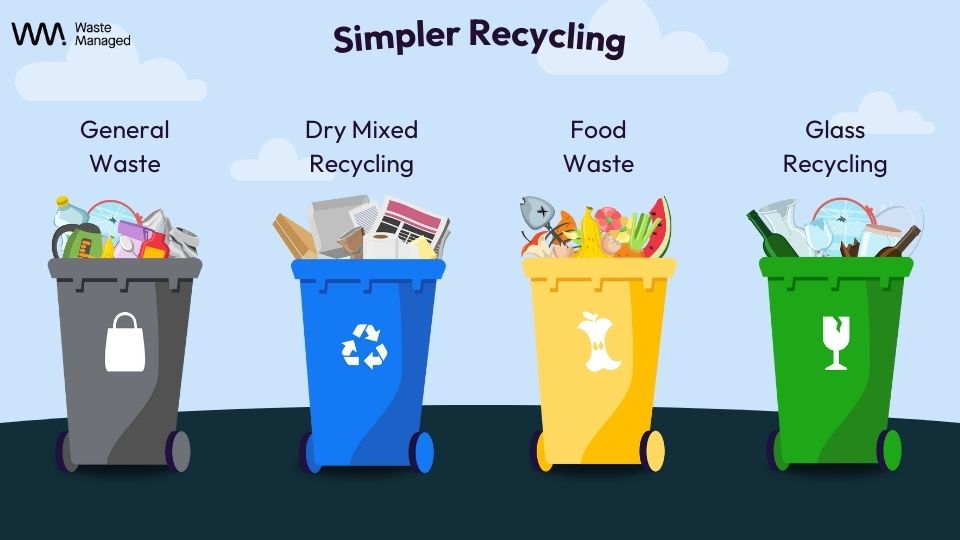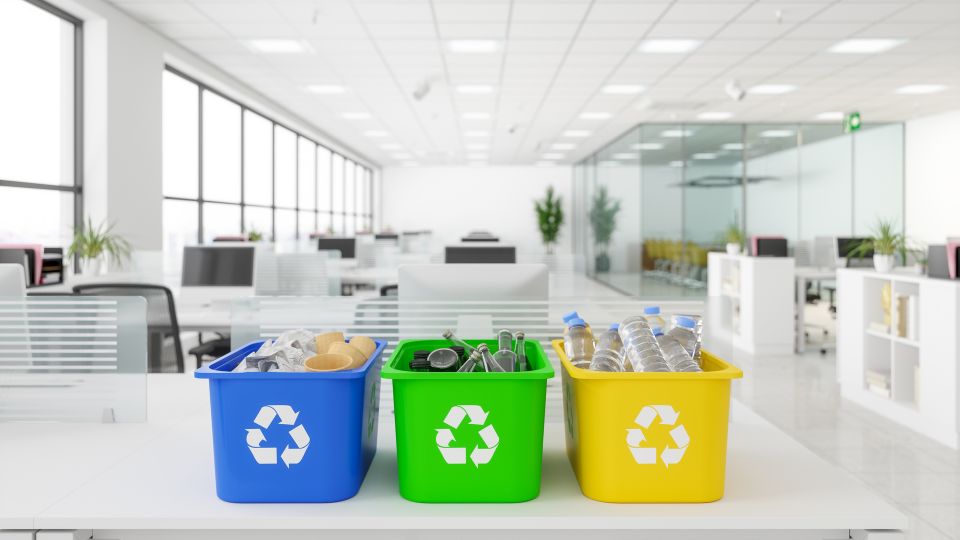
Proper waste management and recycling routines are essential for any business as they contribute to environmental sustainability and operational efficiency.
Understanding the advantages of recycling can help UK business owners make informed decisions that benefit both their company and the community.
This blog explores the key benefits of recycling, providing insights into the importance of establishing effective waste management practices.
Table of Contents
- Understanding Recycling
- Environmental Benefits of Recycling
- Economic Advantages of Recycling
- Advantages of Recycling Metal
- The Importance of Recycling Cardboard Waste
- Implementing Recycling in Your Business
- Overcoming Common Recycling Challenges
- Conclusion
Understanding Recycling
Recycling involves converting waste materials into new products, reducing the consumption of fresh raw materials, energy usage, and pollution.
Effective recycling routines require using recycle bins and understanding the recycle symbol to sort materials correctly.
Environmental Benefits of Recycling

Reduces Pollution
Recycling reduces the need for raw material extraction, which decreases air and water pollution. By diverting waste from landfills, recycling helps minimise methane emissions and other pollutants.
Conserves Natural Resources
Recycling conserves natural resources such as timber, water, and minerals. For instance, recycling paper reduces the need for deforestation, while recycling metals conserves valuable ore reserves.
For every tonne of paper recycled, 17 trees can be saved, and the water used in manufacturing is cut by 50%.
Saves Energy
Producing new products from recycled materials consumes less energy compared to manufacturing from raw materials. For example, recycling aluminium saves up to 95% of the energy required to produce new aluminium from bauxite ore.
Economic Advantages of Recycling

Cost Savings
Effective waste management can lead to significant cost savings for businesses. Recycling reduces disposal costs and can even generate revenue from selling recyclable materials to recycling centres.
Job Creation
The recycling industry creates jobs at various stages, including collection, processing, and manufacturing. This will boost the economy and will provide employment opportunities within local communities.
Compliance with Regulations
Implementing recycling routines ensures compliance with environmental regulations, avoiding potential fines and enhancing your business’s reputation.
Advantages of Recycling Metal
Reduces Mining Impact
Recycling metals such as aluminium, steel, and copper reduces the environmental impact of mining activities. This includes lowering greenhouse gas emissions and reducing habitat destruction.
Energy Efficiency
Recycling metals is significantly more energy-efficient than extracting and processing raw materials. This results in lower energy consumption and reduced carbon footprint for your business.
Financial Benefits
The market value of recycled metals can provide a substantial financial return. Businesses can sell scrap metals to recycling centres, generating additional income while promoting sustainable practices.
The Importance of Recycling Cardboard Waste
Reducing Waste Volume
Cardboard is a major component of business waste. Recycling cardboard helps reduce the volume of waste sent to landfills, conserving space and reducing landfill-related pollution.
Conserving Resources and Energy
Recycling cardboard saves trees and reduces the energy required to produce new cardboard products. It also reduces water usage and greenhouse gas emissions associated with cardboard production from virgin materials.
Cost Savings
Cardboard recycling can lead to cost savings in waste disposal fees. By selling or donating recyclable cardboard, businesses can also generate additional revenue or reduce waste management expenses.
Implementing Recycling in Your Business

Establish Clear Guidelines
Create a recycling policy outlining what materials can be recycled, how to sort them, and where to place them. Ensure all employees are trained on these guidelines.
Use Proper Recycling Bins
Place clearly labelled recycle bins throughout your facility to encourage proper waste sorting. Use bins with the recycle symbol to make them easily identifiable.
Partner with Recycling Centres
Collaborate with local recycling centres to streamline your waste management processes. These centres can provide guidance and resources to help you improve your recycling routines.
Overcoming Common Recycling Challenges
Contamination Issues
Educate employees on what materials are recyclable and how to clean them before disposal to prevent contamination. This ensures that the recycling process remains efficient and effective.
Space Constraints
Optimise your workspace by using compact recycling bins and scheduling regular waste pickups. This helps manage space effectively and keeps your facility organised.
Lack of Awareness
Regularly communicate the benefits and importance of recycling to your team. Highlighting the advantages of recycling can motivate employees to participate actively in recycling initiatives.
Conclusion
Understanding the advantages of recycling is crucial for UK business owners seeking to implement effective waste management practices. From reducing environmental impact to saving costs and complying with regulations, recycling offers numerous benefits that can enhance your business operations.
By integrating recycling routines and collaborating with recycling centres, your business can contribute to a more sustainable future.
For more information on recycling and waste management, consult with local environmental agencies and industry experts. Taking proactive steps today will improve your business’s sustainability and support the broader community and environment.








